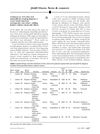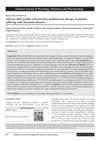 74 citations,
January 2006 in “Endocrine journal”
74 citations,
January 2006 in “Endocrine journal” Low-dose gonadotropin treatment is effective for infertility in women with PCOS, leading to high ovulation rates and comparable pregnancy rates with fewer complications.
 69 citations,
July 2015 in “Pharmacotherapy”
69 citations,
July 2015 in “Pharmacotherapy” Low-dose finasteride may cause lasting sexual dysfunction and suicidal thoughts in young men.
 39 citations,
February 2021 in “Journal of The American Academy of Dermatology”
39 citations,
February 2021 in “Journal of The American Academy of Dermatology” Low-dose oral minoxidil safely treats hair loss, with hypertrichosis as main side effect.
 36 citations,
May 2015 in “Australasian Journal of Dermatology”
36 citations,
May 2015 in “Australasian Journal of Dermatology” Low dose oral minoxidil helps regrow hair in permanent chemotherapy-induced alopecia.
 23 citations,
February 2014 in “Journal of Pediatric and Adolescent Gynecology”
23 citations,
February 2014 in “Journal of Pediatric and Adolescent Gynecology” Low-dose finasteride reduces excessive hair growth in teenage girls safely and affordably.
 18 citations,
August 2011 in “Clinical Drug Investigation”
18 citations,
August 2011 in “Clinical Drug Investigation” Low-dose isotretinoin combined with pulsed azithromycin cleared acne in most patients, with mild side effects.
 12 citations,
September 2018 in “Dermatologic Therapy”
12 citations,
September 2018 in “Dermatologic Therapy” Daily low-dose aspirin lowers minoxidil's effectiveness for hair loss treatment.
 2 citations,
January 2023 in “Curēus”
2 citations,
January 2023 in “Curēus” Low-dose naltrexone may help reduce redness in certain scalp conditions.
 2 citations,
January 2021 in “Journal of The American Academy of Dermatology”
2 citations,
January 2021 in “Journal of The American Academy of Dermatology” Low-dose oral minoxidil for hair loss seems to have rare side effects, but more research is needed to confirm its safety.
 2 citations,
January 2010 in “Hormone Molecular Biology and Clinical Investigation”
2 citations,
January 2010 in “Hormone Molecular Biology and Clinical Investigation” Low dose finasteride decreases certain steroids, possibly increasing depression risk.
 1 citations,
July 2017 in “The Journal of Urology”
1 citations,
July 2017 in “The Journal of Urology” Low-dose finasteride and dutasteride reduce PSA levels by 27.8% in men with male androgenetic alopecia.
 January 2023 in “National journal of physiology, pharmacy and pharmacology”
January 2023 in “National journal of physiology, pharmacy and pharmacology” Low-dose methotrexate is generally safe but can cause mild to severe side effects, and folic acid can reduce these risks.
 June 2019 in “Poster presentations”
June 2019 in “Poster presentations” Low dose methotrexate does not increase hair fall and may reduce it.
 75 citations,
July 2013 in “The Journal of Clinical Endocrinology and Metabolism”
75 citations,
July 2013 in “The Journal of Clinical Endocrinology and Metabolism” Taking low-dose spironolactone and metformin together works better for PCOS symptoms than either drug alone.
 29 citations,
September 2004 in “Fertility and Sterility”
29 citations,
September 2004 in “Fertility and Sterility” Intermittent low-dose finasteride works as well as daily use for treating excessive hair growth in women.
 17 citations,
June 2012 in “Australasian Journal of Dermatology”
17 citations,
June 2012 in “Australasian Journal of Dermatology” Finasteride and low-dose dutasteride combo improves hair growth and reduces hair loss with no major side effects.
 113 citations,
April 1999 in “The Journal of Clinical Endocrinology and Metabolism”
113 citations,
April 1999 in “The Journal of Clinical Endocrinology and Metabolism” Cyproterone acetate-estrogen most effective for hirsutism, but consider side effects and patient needs.
 23 citations,
April 1999 in “The Journal of Clinical Endocrinology and Metabolism”
23 citations,
April 1999 in “The Journal of Clinical Endocrinology and Metabolism” All treatments reduce hair growth; low dose flutamide most effective with fewer side effects.
 30 citations,
March 2001 in “Environmental Health Perspectives”
30 citations,
March 2001 in “Environmental Health Perspectives” Small changes in hormones can significantly impact health, showing the importance of sensitive testing for chemicals that disrupt hormones.
 2 citations,
March 2001 in “Environmental Health Perspectives”
2 citations,
March 2001 in “Environmental Health Perspectives” Small hormonal imbalances can cause significant health problems, so more sensitive testing for hormone-disrupting chemicals is needed.
 March 2004 in “Journal of The American Academy of Dermatology”
March 2004 in “Journal of The American Academy of Dermatology” Patients with systemic lupus erythematosus and hair loss had fewer hair follicles and non-scarring alopecia; direct immunofluorescence was not helpful in diagnosing lupus in these cases.
4 citations,
January 2019 in “PubMed” Low dose valproate in epileptic children mainly causes weight gain and other non-life-threatening side effects.
1 citations,
August 2021 in “Cosmoderma” Low-dose oral minoxidil is effective and well-tolerated for treating hair loss.
6 citations,
April 2022 in “Journal of The American Academy of Dermatology” Low-dose oral minoxidil improved hair growth in most pediatric patients with mild side effects.
 September 2024 in “Journal of the American Academy of Dermatology”
September 2024 in “Journal of the American Academy of Dermatology” Experts agree on guidelines for safely using low-dose oral minoxidil to treat hair loss.
 March 2024 in “Clinical, Cosmetic and Investigational Dermatology”
March 2024 in “Clinical, Cosmetic and Investigational Dermatology” Saudi dermatologists know about low-dose oral minoxidil for hair loss but don't often prescribe it, partly due to its unavailability.
 October 2023 in “Journal of The American Academy of Dermatology”
October 2023 in “Journal of The American Academy of Dermatology” Taking a small dose of the hair growth medicine minoxidil by mouth does not really change your blood pressure.
 July 2023 in “Dermatology practical & conceptual”
July 2023 in “Dermatology practical & conceptual” Low dose oral minoxidil helped treat long-term hair loss caused by chemotherapy in 15 patients.
 2 citations,
July 2022 in “Journal of the American Academy of Dermatology”
2 citations,
July 2022 in “Journal of the American Academy of Dermatology” The safety and tolerability of low-dose oral minoxidil for treating hair loss in adolescents is not clearly determined.
 September 2024 in “Archives of Dermatological Research”
September 2024 in “Archives of Dermatological Research” Both treatment combinations improved hair growth similarly and were safe.


























